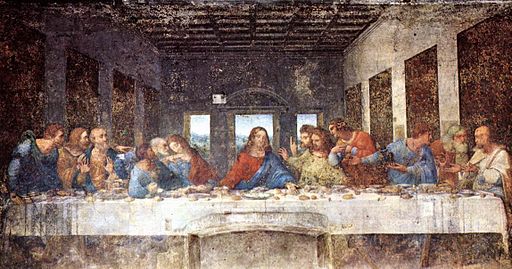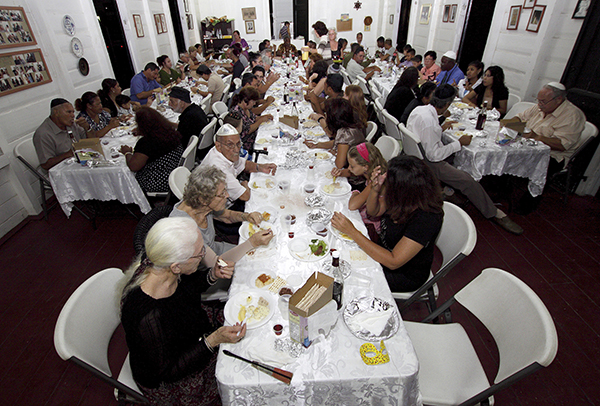The ‘Splainer (as in “You’ve got some ‘splaining to do”) is an occasional online feature in which RNS staff give you everything you need to know about current events to hold your own at the water cooler.
(RNS) Holy Thursday or Maundy Thursday is a time when Christians believe Jesus celebrated the Last Supper with his disciples, breaking bread and wine with them for the last time before his Crucifixion on Good Friday. Recently, it has become a practice in some Christian churches and homes to hold a “Christian seder” on this night, adapting to a Christian context rituals and practices from the Jewish Passover meal. But was the Last Supper really a Passover seder? And should Christians borrow from one of the most important observances of the Jewish calendar? Scholars, both Christian and Jewish, think not. Let us ‘splain …

Leonardo da Vinci’s “The Last Supper” painting.
Q: Why do some people think the Last Supper was a Passover seder?
A: It comes out of the New Testament: Three of the four Gospels say Jesus prepared for the Last Supper during the Jewish holiday. Mark says it happened on the first day “of unleavened bread, when they sacrificed the Passover lamb.” There are also some similarities between the biblical Last Supper and a Passover seder. Scholar Joachim Jeremias listed 14 of them, including the breaking of bread, the drinking of wine, the singing of hymns and discussing the meaning of all of these.
“If Jesus and his disciples gathered together to eat soon after the Passover lamb was sacrificed, what else could they possibly have eaten if not the Passover meal?” writes Boston University prof Jonathan Klawans in his well-regarded examination of the supper-seder link. “And if they ate the Passover sacrifice, they must have held a seder.”
Q: OK, then, history has decided. The Last Supper was a Passover seder. Pass the wine.
A: Except Klawans and other scholars think it wasn’t. For one thing, they point to the Gospel of John, which tells a different story — that the Crucifixion happened on the “day of preparation for the Passover,” meaning Jesus died before the holiday began. And if we are to believe the other three Gospels, that would mean the trial of Jesus, a Jew, was held during the holiday when such things were banned. More likely the Last Supper was an average Jewish meal.

Surinamese Jews share the Passover seder at the Neve Shalom Synagogue in Paramaribo on April 18, 2011. The Suriname Jewish community, considered one of the oldest in the Americas, has only around 200 members. Photo courtesy of REUTERS/Ranu Abhelakh
*Editors: This photo may only be republished with RNS-SEDER-SPLAINER, originally transmitted on March 24, 2016.
Q: If the Last Supper wasn’t a seder, where did some contemporary Christians get the idea to hold a seder on Holy Thursday?
A: Klawans and others think it stems from a spirit of interfaith exploration that developed in the 1960s and continues today — Pope Francis’ best friend is a rabbi, and cities and towns everywhere have interfaith councils. Many lay Christians and Jews were exposed to each others’ practices for the first time.
Add to that a growing interest in the historical Jesus — who was Jewish — and the result is a growing fascination among Christians with what the real Jesus did, said and experienced. Rebecca Cynamon-Murphy, who writes about interfaith issues from the perspective of her own Jewish-Christian household, writes of Christians who hold seders, “Their logic is that since Jesus was celebrating Pesach (Hebrew for Passover) during the week when he was arrested, tried, executed and resurrected, in a desire to be more Christ-like, they too should celebrate the holiday.” Today, there are a variety of Christian seder manuals, many mapped out like the Haggadah, the book of prayers, songs and scripture Jews use throughout their own seders. Some even have “Hebrew for Christians” pronunciation guides.
Q: Is that kosher?
A: Many Christians love their newly adapted seder, saying it links them more firmly to the Old Testament, provides context for the life of Jesus and gives them a deeper understanding of Judaism, which Christianity sprang from. But others are less comfortable in the borrowed rituals. Jews suffered centuries at the hands of Christians and have no right to usurp the story of Jewish deliverance from slavery, they say.
“I wonder, though, how Christians would feel about Jews or Muslims having play Eucharists?” writes the Rev. Ann Fontaine, an Episcopal pastor in Wyoming. “Dressing someone up like a priest and saying the words from the Book of Common Prayer?”
Professor Klawans revisits the Last Supper/Passover seder debate every year in his own preparation for Passover. This year, he writes that the Last Supper is still not a Passover seder. In fact, Passover 2016 begins one month after Holy Thursday, at sundown on April 22. Then he adds, “But why should historical skepticism ruin anyone’s holiday? Happy Easter and Chag Sameach (Hebrew for ‘Happy Holiday’) to any and all who celebrate!”
(Kimberly Winston is a national correspondent for RNS)





